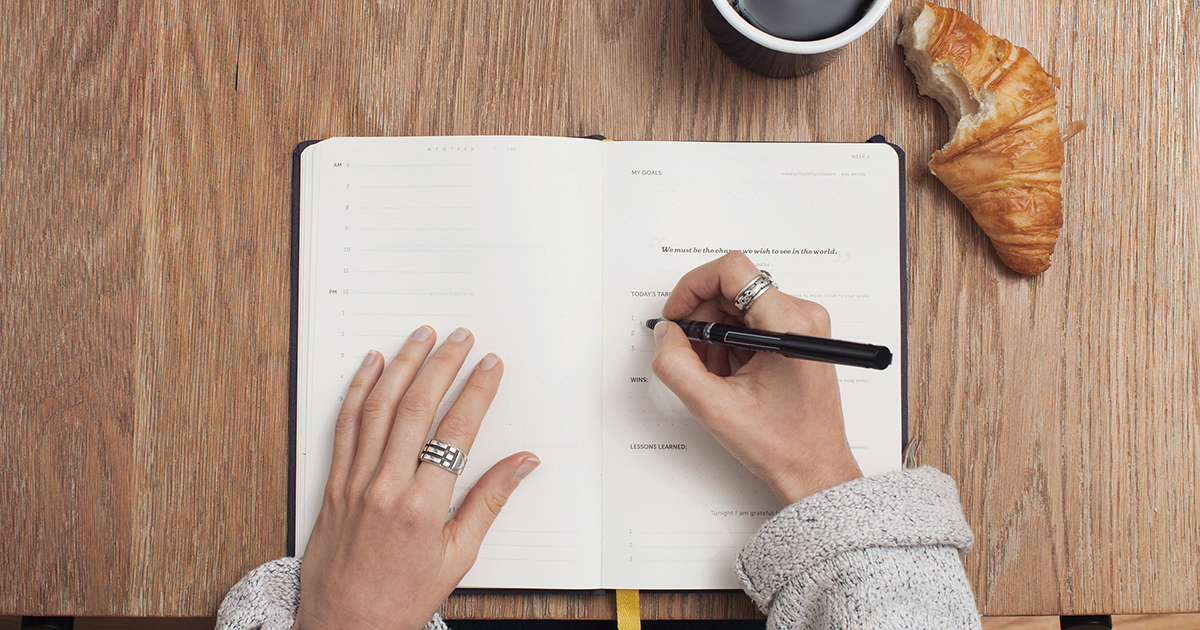During my twenties, I started a morning journaling practice because I was a stressed-out graduate student. The practice lowered my anxiety, boosted my happiness, and helped me finish my degree. Those were only a few of the benefits of journaling I experienced.
Surprisingly, my journaling habit stuck! I’ve been journaling for the past twenty years. It’s a beloved creative project.
Writing in my journal has benefited my life in so many ways. It’s helped me:
- navigate grief,
- career changes,
- start a gratitude practice,
- and rethink how I care for my health.
For example, I struggled with anxiety during the pandemic. Journaling each morning helped me cope, and stay grounded and grateful. Also, my journaling practice brought joy, delight, and creative ideas into my life. In short, it’s a morning ritual I don’t skip.
If you’re not a morning person, don’t worry! You can create an evening journaling ritual that supports your life. The key is to make journaling a daily habit.
What are the benefits of journaling?
There are so many advantages to cultivating a journaling routine. Before I dive into all the benefits, I thought it would be useful to share why I’ve continued to journal for so many years:
Journaling boosts my mental health. For example, my counselor encouraged me to use expressive writing and gratitude lists to cope with anxiety. It’s a helpful practice! Also, research suggests that journaling can support people who struggle with depression and it can help regulate emotions.
Journaling improves my physical health. Whenever I journal, I feel like my blood pressure and stress levels go down. My experience aligns with research on the topic. Research suggests that journaling can lower your blood pressure, improve lung and liver function, decrease stress, and more.
Journaling is fun! I’m making fun a priority because research suggests that having fun is “essential for our health and happiness.” If you need more fun in your life, read The Power of Fun: How to Feel Alive Again by Catherine Price.
13 Benefits of Journaling
Improved health outcomes and having fun are the main reasons I continue to journal. Below you’ll find additional reasons to put your pen to the page:
Benefit #1: Mood booster.
Journaling helps me reframe my thoughts and focus on what I’m grateful for. This combination brings more joy and delight into my daily life.
Benefit #2: Achieving goals.
Over the years, I’ve achieved big goals like writing books and starting my small business. Journaling about my goals helped me achieve them. It also helped me keep track of my progress.
Benefit #3: Creative inspiration.
Writing in my journal is a big part of my creative life. It’s also inspired me to try activities like drawing and learning a new language.
Benefit #4: Enhance memory.
My memory isn’t very good. Being able to record to-do lists, stories, and creative ideas in my journal is an essential part of my life.
Benefit #5: Strengthens communication skills.
Journaling helps me become self-aware and identify my feelings. In turn, my communication skills continue to improve.
Benefit #6: Facilitates learning.
Whenever I’m in a meeting or a class, I take notes. Taking notes helps me remember what I’ve learned and it reinforces core concepts.
Benefit #7: Improves sleep.
If I can’t sleep at night, I get up and write about my worries in my journal. This calms my mind. After a short journaling session, I’m able to sleep soundly.
Benefit #8: Appreciate goodness.
Writing a gratitude list, even when I’ve had a tough day, helps me appreciate the good people, places, and things in my life.
Benefit #9: Track projects.
Bullet journaling is a great tool for tracking projects and to-do lists. You can also use the system to maintain habits and to improve your mental health. Learn more.
Benefit #10: Antidote to screen time.
Journaling is a wonderful alternative to scrolling the news or social media. When I have the urge to scroll the news, I pick up my journal.
Benefit #11: Promotes mindfulness.
I have a tendency to ruminate and overthink situations. Engaging in activities like expressive writing is one way I practice mindfulness.
Benefit #12: Improves job performance.
When I’m struggling with a work project, I write about it. Writing helps me solve problems. I also use my journal to celebrate small victories at work.
Benefit #13: Fun with friends.
I’ve started to go on journaling dates with friends. We usually meet at a coffee shop, talk for a little while, and then we write together. This encourages me to keep journaling, and it’s a wonderful way to nourish my relationships. Remember, one key to happiness is developing strong relationships.

How do I start journaling?
I love journaling in the early morning hours. It’s a quiet and magical time of the day. After I make coffee, I spread out my pens and notebooks on the kitchen table and write for a minimum of five minutes. I usually end up writing for 20-30 minutes.
Also, I try not to be rigid with my routines. There is more than one way to experience the benefits of journaling. For example, we adopted a kitten in 2021. After I got out of bed, our kitten wanted to play and snuggle. As a result, I journaled later in the day. I had to remind myself that it was okay to change my routine because life isn’t static.
Starting a journaling ritual doesn’t have to be time intensive. Lavinia Spalding, the author of Writing Away, argues that you don’t need to write for hours to reap the benefits of journaling. Instead, you can do “short sessions, many times.” I love this idea!
If you are new to journaling, here a few tips to get started:
First, gather your tools. You’ll need a pen and a journal, or you can use your smartphone. For example, an app like Day One makes digital journaling simple and easy. Remember: choose a journaling tool that works for you.
Second, pick a time to journal and start small. Set aside five minutes in the morning (or in the evening) for your journaling practice. Try to stick with your new habit for a month or two. It will give you the momentum to keep writing, and it will become an extension of your routine.

What should I journal about?
A quick Google search will give you lots of journaling ideas. Some ideas include: free writing, bullet journaling, drawing, writing gratitude lists, making collages, and more.
If you’re not sure where to begin, below are three ideas to consider:
- Delight Diary. During 2020, I read The Book of Delights by Ross Gay. He inspired me to start recording daily delights with words and photos. I’ve been doing both for the past few years. It’s fun and takes less than 10 minutes a day!
- Morning Pages. Julia Cameron, the author of The Artist’s Way, encourages readers to write in the mornings. She calls the exercise “Morning Pages,” and it’s where you handwrite anything that comes to mind. It’s a great way to clear your mind.
- The Noticing Notebook. Recently, I started a new journaling project—”The Noticing Notebook.” At a minimum, I record three things that I notice in my journal each day. The project has helped me get out of my head and pay attention to my surroundings.
Why You Should Consider a Daily Gratitude Journal
Gratitude journaling enables me to let go of tension and anxiety. More importantly, it gives me clarity; clarity about the tiny beautiful moments that I experience each day. Daily entries in your gratitude journal can be a few words or sentences. It’s an easy way to get started with journaling.
Mental Health Benefits of Journaling
From dealing with traumatic events or day-to-day stress, getting your thoughts on paper can provide some relief. Since we know that mental and physical health are very much intertwined, you can expect physical health benefits too!
And, it only takes “15-20 minutes on 3-5 occasions” to see the benefits.
Get Started with these Journaling Prompts
If you’re in the mood to journal, respond to one of my favorite journaling prompts below:
- What hobby brings joy and fun into your daily life? Why?
- What delighted you this week? Write a list of as many delights as possible.
- Write a list of 5 things, or more, that you noticed this week.
- What negative thoughts are holding you back today?
- Write about a simple, healthy way to start the day.
- If I could create the perfect day, what would be on the schedule?
Choose one prompt, set a timer for five minutes, and start writing. Don’t forget to have fun!
Looking for more helpful prompts? Read the following articles and newsletter:
